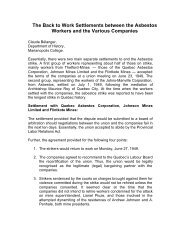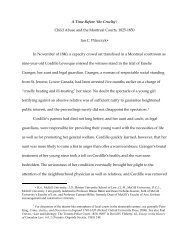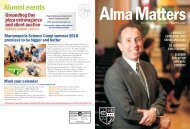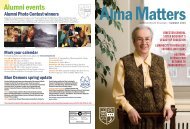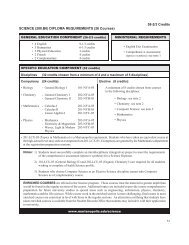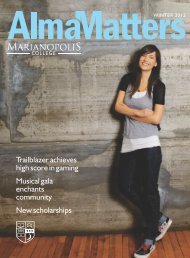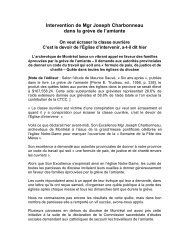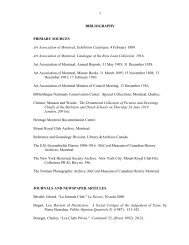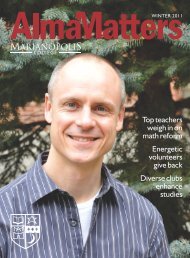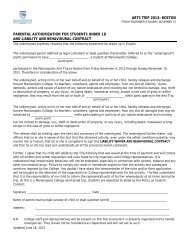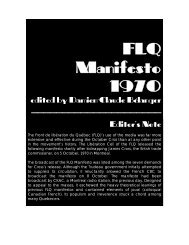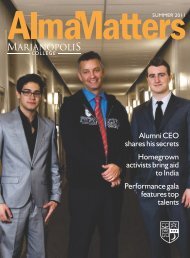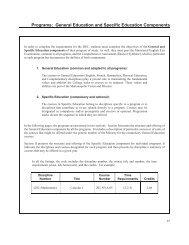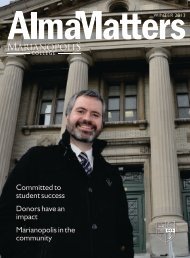General Education: Humanitiesunderstanding, like other forms ofknowledge, is informed by societalforces.Cornerstones of MedievalKnowledgeThe "Middle Ages" refers to a periodof European history spanning the1000 years between roughly the 5thand the 15th centuries. Rather thanbeing so-called "Dark Ages", theperiod generated knowledge that hada significant impact on developmentsin subsequent periods. Many areas ofhuman endeavour that are celebratedtoday had their genesis or gotaffirmed during this period, thetime of infancy of our contemporaryworld. With lectures, discussions,group work and other in-classactivities, we explore some of thecornerstones of medieval knowledge.Rather than taking a strictly chronologicalapproach, we will look at theMiddle Ages in thematic blocks:Religion and Religious Authority,Culture and Learning, Society, andKnowledge of the World. In order tomore fully appreciate their legacy, wealso examine and challenge some ofthe common pre-conceived notionsabout the Middle Ages.The American CenturyThis course attempts to help studentsto understand American civilizationand evaluate its impact on thetwentieth century. It examines theachievements and limitations ofAmerican civilization both at homeand abroad. The course takes aninterdisciplinary approach toknowledge of American civilization.It illustrates how different forms ofknowledge: the social sciences,history, philosophy, the arts, andliterature can help us to develop ourknowledge of American civilizationand evaluate its impact on the world.World Views345-102-MQ (3-0-3) 2 credits- 3 hours of class- 3 hours of homeworkCourses in this category explore arange of world views from theindividual to the ideological, thenational to the cross-cultural, the pastto the present.The Ancient GreeksThis course introduces students to theimportance of world views and theirrelationship to society by studying theAncient Greeks from earliest times tothe Hellenistic period. Included in thecourse are the major ideas of Greekpoets, playwrights, philosophers,historians, and scientists. Studentsare introduced to the rich diversity ofworld views and experiences whichcharacterized the Ancient Greeks andwhich led them to influence andshape Western Civilization.Strangers, Gods, and Monsters:Storytelling from Religions Aroundthe WorldThe purpose of this course is tointroduce students to the art ofstorytelling in religious culture.Students begin with questions aboutstorytelling itself, such as why we tellthe stories we tell and what functionsthese stories serve in various religiouscommunities. Students then explorea series of important mythologicalmotifs such as creation narratives;the virtual omnipresence of godsaround the world, the monstrous,scapegoats and animals. Althoughcertain assumptions are prevalentconcerning these themes, this courseattempts to deconstruct them andbring new light to very old traditions.Since this course is not dependentupon any one religious traditionalone, it has the benefit of exploringthese mythic motifs in various traditionsaround the world, and thusthrough careful comparative efforts,provide a window into ideas that maypossibly be the fruit of a universalhuman experience, or at the veryleast, a universally limited humanimagination.Art and Culture of the AncientAmericasThis course explores the artistic andcultural traditions of the AncientAmericas. The prehistoric populationsof the Americas are traced, followingthe evolution of different artistictraditions and the lifestyles andbeliefs they reflect. Students explorein detail the evolution of severaldistinct cultures, ranging from thosethat created the soapstone carvingsof the Arctic, to the striking designsof Pacific coast totems, to the intricatepatterns of southwest sand-painting,to the monumental pyramids ofCentral and South America. Theimpact of the arrival of Europeansis also studied.Aboriginal Cultures in CanadaCanadian Aboriginal peoples arepresently facing critical issuessurrounding the struggle for thesurvival of their various culturalidentities. This course focuses onstudying Aboriginal world viewsthrough an appreciation of culture.Students study representative groupsfrom each region of Canada(including Eastern Woodlands, Plains,Northwest Coast, and Arctic), with anemphasis placed on aspects of FirstNations, Metis and Inuit culture suchas material culture, traditional beliefsystems, creation stories, and socialstructure. The course also addresseshistorical and contemporary40
Aboriginal issues, from land claims toself-government to resource rights.Connections are made withindigenous peoples in other partsof the world as a way of addressingcommon issues and questions regardingindigenous peoples’ rights.Stories and StorytellingIn today’s rapidly changing society,much of our heritage gets lost in theshuffle as borders of all descriptionscome down, cultures assimilate, andwe move closer towards a globalsociety. This course examines howculture is transmitted from society tosociety, and generation to generation,using the art of storytelling. Includedis a look at myths and fables fromdifferent cultures, as well as personalmyths, oral histories and familystories. Practical storytelling exercisesare included as part of the course. Byfinding our personal heritage, we notonly discover our-selves and ourworld, but we develop the capacityto change it as well.The Hero’s Journey, Myth and theModern WorldSome stories are retold so often andwith such frequency that they becomean unnoticeable part of our culture.We cease to ask how they influenceour beliefs, decisions, and actions.Living in an age where our encounterswith individuals from other culturesare becoming easier and morefrequent, it has become increasinglyimportant to understand both our ownbeliefs and those of the people wemeet. This course considers the waysthe stories people create, shape, andreveal their perception of their world.Included is a selection of European,Asian, and Middle Eastern myths andlegends that represent some ofHumanities most influentialnarratives. Also included areselections from The Hero With aThousand Faces, which provides aframework for critical inquiry. Byconsidering how these stories informthe struggle to establish successfulsocieties, we will begin to understandthe basis of the differences andsimilarities we find between peoples.Shifting Visions of the CosmosA world view is a construct thatreflects and informs our attitudetoward reality – i.e. our view ofnature, of society and (mostimportantly) of ourselves and whatour relation is to everything else. Inthis course we first consider thenature of a world view – what it is,how it gets created and changed, andwhat it does. Then, we use that as abasis for examining the major worldviews that have been dominant in thedevelopment of Western civilization:ancient, medieval, modern andcontemporary. Our goal is to see howthese world views have both shaped –and been shaped by – the greatachievements and events in westernhistory.Education’s EndThis course will explore educationand raise the question of why andhow education may be of value. Sinceit aims to raise important questionsabout the system students are alreadyengaged in by virtue of their being“students,” this course will attempt adual methodology: weekly lectureswill provide the theoretical andhistorical framework while classdiscussions will provide the mentalspace for students to negotiate thematerial personally for themselves.Each week will therefore consist ofone lecture and one discussion forumin which students will raise questionsfor themselves about the educationalsystem they are already engaged in.General Education: HumanitiesWhat better question to providestudents with?Nineteenth-Century ThinkersThe mid-nineteenth century inEurope was a time of radical socialand intellectual change. This agewitnessed the birth of Marxism andof the theory of evolution; the firstdebates about women's rights andcapital punishment; and the firstattempts at coping with massindustrialization and urbanizationthrough mass education. This courselooks at the nineteenth century as anage of new ideas and rapid changeand examines the writings of eminentEuropean writers.The Voice as InstrumentSinging is a central element of humanexpression that influences our lives inmany ways. Throughout history thehuman voice has been considered asone of the most alluring, powerful andeven dangerous of all musicalinstruments. This course will explorethe singing voice from perspectivesbeginning with an introduction to thephysiology of singing. This isfollowed by an exploration andcomparison of how different culturesuse the human voice as an instrumentof worship, communication, healing,knowledge, friendship, and protest.Students have the opportunity toattend and reflect upon liveperformances.Tattoos, Trophies and T-cellsIn this course we look at conceptsof the body in various cultures anderas. Based on descriptions of illness,healing, sports, the arts, and religiousrituals, the class discusses how worldviews are reflected in the ways wetreat, use, and experience our bodies.We also ask how these views and41
- Page 2 and 3: VISIONMarianopolis College, drawing
- Page 4 and 5: GENERAL INFORMATION: Introduction t
- Page 6 and 7: AdmissionsOUT-OF-PROVINCEAPPLICANTS
- Page 8 and 9: Financial Information• Birks Fami
- Page 10 and 11: Financial InformationConfirmation F
- Page 12 and 13: Academic Information• Failure (EC
- Page 14 and 15: Academic InformationThose who are a
- Page 16 and 17: Rules and Regulationsand whether su
- Page 18 and 19: EDUCATIONAL RESOURCES & SERVICESAss
- Page 20 and 21: Educational Resources and ServicesS
- Page 22 and 23: CHOOSING A PROGRAMDiploma Programs
- Page 24 and 25: CertificatesSpecial InterestCertifi
- Page 26 and 27: Programs: General Education and Spe
- Page 28 and 29: General EducationGENERAL EDUCATION
- Page 30 and 31: General Education: Englishidentifyi
- Page 32 and 33: General Education: Englishas the fi
- Page 34 and 35: General Education: Englishintended
- Page 36 and 37: General Education: Frenchand curren
- Page 38 and 39: General Education: Frenchce cours t
- Page 40 and 41: General Education: HumanitiesHumani
- Page 44 and 45: General Education: Humanitiespracti
- Page 46 and 47: General Education: Humanitiespracti
- Page 48 and 49: General Education: Physical Educati
- Page 50 and 51: General Education: ComplementaryCom
- Page 52 and 53: General Education: ComplementaryMod
- Page 54 and 55: SECTSpecificEducation Component- Sc
- Page 56 and 57: Science: Biology - ChemistryBiology
- Page 58 and 59: Science: Mathematics - PhysicsR and
- Page 60 and 61: 56-2/3 to 58 CreditsSOCIAL SCIENCE
- Page 62 and 63: Social Science: Profiles - General
- Page 64 and 65: Social Science: Psychology ProfileE
- Page 66 and 67: Social Science: Law, Society and Ju
- Page 68 and 69: Social Science: Honours CommerceHon
- Page 70 and 71: Social Science: Anthropology - Biol
- Page 72 and 73: Social Science: History - Mathemati
- Page 74 and 75: Social Science: Political Sciencedi
- Page 76 and 77: Social Science: Religion - Sociolog
- Page 78 and 79: 54-2/3 CreditsCREATIVE ARTS, LITERA
- Page 80 and 81: Creative Arts, Literature and Langu
- Page 82 and 83: Creative Arts, Literature and Langu
- Page 84 and 85: Creative Arts, Literature and Langu
- Page 86 and 87: Creative Arts, Literature and Langu
- Page 88 and 89: Creative Arts, Literature and Langu
- Page 90 and 91: Creative Arts, Literature and Langu
- Page 92 and 93:
58-2/3 CreditsMUSIC (501.A0) DIPLOM
- Page 94 and 95:
MusicEar Training and Theory IV551-
- Page 96 and 97:
59-1/3 CreditsARTS AND SCIENCES (70
- Page 98 and 99:
Arts and Sciences: English - Humani
- Page 100 and 101:
Arts and Sciences: Art History - Ar
- Page 102 and 103:
Arts and Sciences: Mathematics - Mu
- Page 104 and 105:
Arts and Sciences: Multidisciplinar
- Page 106 and 107:
56-2/3 to 58 CreditsLIBERAL ARTS (7
- Page 108 and 109:
Liberal Artsof evolution; the first
- Page 110 and 111:
Liberal ArtsOptionalIn addition to
- Page 112 and 113:
Teaching FacultyFLEISCHER, George T
- Page 114 and 115:
Teaching FacultyTRILLER, Bernice Sh
- Page 116:
INDEX II: Programs and CoursesGener



